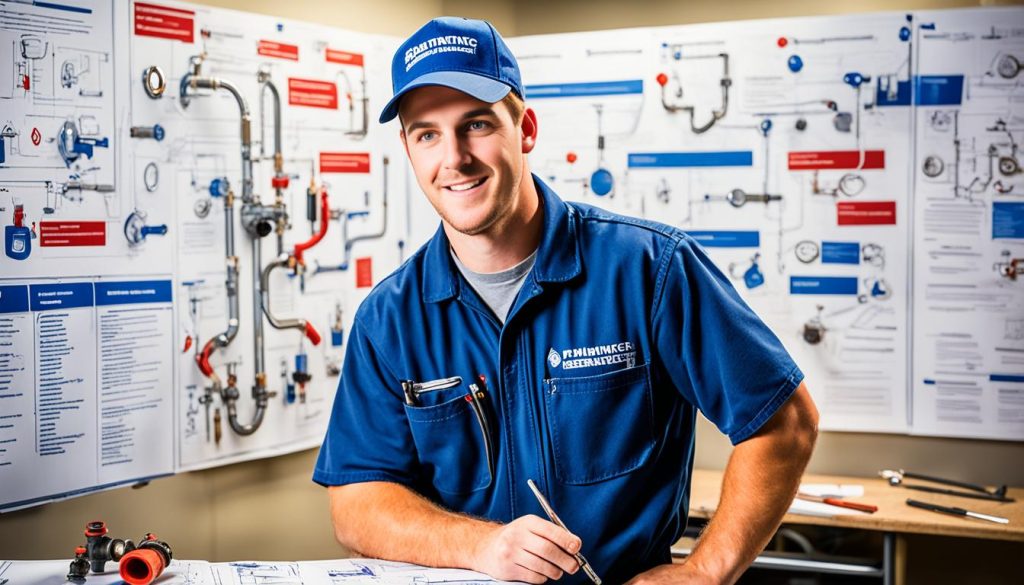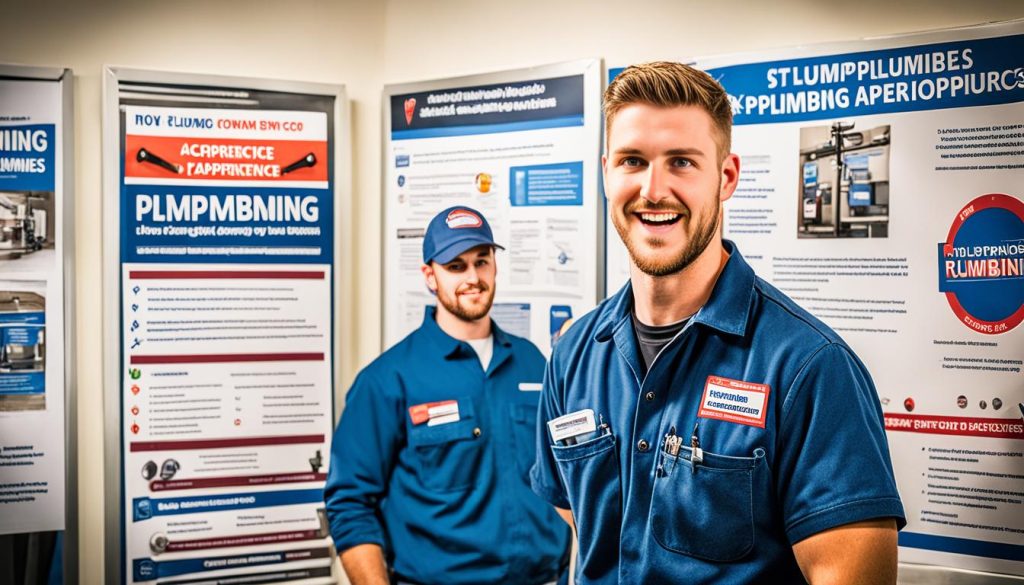Becoming a Plumbing Apprentice: A Step Guide
Did you know that the demand for skilled plumbers in Canada is on the rise? With the country experiencing a growing construction industry and an aging infrastructure, there is a significant need for qualified individuals to join the plumbing workforce. Becoming a plumbing apprentice is an excellent way to kickstart your career in the plumbing industry and seize the opportunities that await.
Key Takeaways:
- Meeting the requirements and going through an application process are the first steps to becoming a plumbing apprentice in Canada.
- There are various ways to find plumbing apprenticeship programs, such as contacting trade schools, plumbing unions, or established plumbing companies.
- Being prepared with the necessary tools and actively participating in your apprenticeship can increase your chances of job opportunities and a competitive apprentice plumber salary.
- Completing the plumbing apprenticeship program leads to a journeyperson certificate and the possibility of becoming a licensed plumber.
- Advancing in the plumbing industry is attainable through experience, further training, and pursuing additional certifications.
Plumbing Apprenticeship Requirements
Before embarking on a plumbing apprenticeship, it’s important to ensure that you meet the necessary requirements. Here are the key prerequisites:
- High school diploma or GED: A basic education foundation is typically required to begin a plumbing apprenticeship.
- Aptitude tests: Some apprenticeship programs may administer tests in subjects like math and science to gauge your suitability for the role.
- Interview: You may also be required to attend an interview as part of the application process to assess your motivation and interest in the plumbing trade.
- Prior plumbing courses or recommendations: Having completed plumbing-related courses or obtaining a letter of recommendation can strengthen your application and distinguish you from other candidates.
By meeting these requirements, you will lay the groundwork for a successful start to your plumbing apprenticeship.
Example Table: Plumbing Apprenticeship Requirements
| Requirements | Description |
|---|---|
| High school diploma or GED | Completion of basic education is typically required. |
| Aptitude tests | Apprenticeship programs may administer tests to assess your aptitude in relevant subjects. |
| Interview | Candidates may be interviewed to evaluate their passion for the plumbing trade. |
| Prior plumbing courses or recommendations | Completing plumbing courses or obtaining letters of recommendation can strengthen your application. |
Finding a Plumbing Apprenticeship Program
When it comes to starting your journey as a plumbing apprentice, finding the right apprenticeship program is crucial. Fortunately, there are multiple avenues you can explore to find the perfect fit for your career goals. Let’s explore some options:
- Ask for recommendations: Reach out to people in the plumbing industry, such as plumbers, contractors, or individuals who have completed their apprenticeships. They can provide valuable insights and recommendations based on their personal experiences.
- Contact local trade or technical schools: These institutions often offer plumbing apprenticeship programs that provide a combination of classroom instruction and hands-on experience. They have established relationships with industry professionals and can guide you in the right direction.
- Connect with plumbing unions: Plumbing unions are resources for aspiring plumbers. They may have apprenticeship programs available or can guide you to reputable programs in your area.
- Reach out to established plumbing companies: Many plumbing companies offer apprenticeship programs to train the next generation of skilled plumbers. By contacting these companies directly, you can inquire about any available apprenticeship opportunities.
Competition for apprenticeships can be fierce, so it’s essential to stand out from the crowd. Consider acquiring some prior plumbing education or obtaining a letter of recommendation to enhance your chances of acceptance into a program.
Here’s an image that showcases the hands-on training you can expect in a plumbing apprenticeship program:
| Pros | Cons |
|---|---|
| Opportunity for hands-on experience | Competitive application process |
| Access to industry professionals and mentors | Possible requirement for prior plumbing education or recommendations |
| Combination of classroom instruction and practical training | Limited availability of apprenticeships |
| Potential for long-term employment with the company | Varying pay scales for apprentices |
Preparing for a Plumbing Apprenticeship
As a plumbing apprentice, it’s important to be prepared and equipped with the necessary tools and knowledge. By being well-prepared, you will increase your chances of job opportunities and a competitive apprentice plumber salary.
When starting your plumbing apprenticeship, you’ll need your own basic set of plumbing tools. These tools will be essential for completing tasks and gaining hands-on experience. Here are some essential plumbing tools that every apprentice should have:
| Plumbing Tools |
|---|
| Pipe cutters |
| Wrenches |
| Pliers |
| Tape measure |
| Hacksaw |
| Screwdrivers |
| Level |
While you may start by borrowing tools from your mentor, it’s recommended to gradually build your own tool kit over time. Having your own tools will not only make you more efficient but will also show your dedication to the trade.
In addition to having the right tools, being open to learning and asking questions is crucial as an apprentice plumber. Take advantage of the knowledge and experience of your mentor and coworkers. Asking questions and seeking clarification will help you understand the plumbing techniques and principles better.
Another important aspect of being a plumbing apprentice is ensuring safety on the job. Plumbing work can involve working with hazardous materials and in confined spaces. Always follow safety protocols and guidelines to protect yourself and others.
By actively participating in your apprenticeship and gaining valuable experience, you will not only enhance your skills but also increase your job opportunities and potential apprentice plumber salary.
Completing the Plumbing Apprenticeship Program
The plumbing apprenticeship program is a comprehensive journey that typically lasts for several years. It combines on-the-job training with classroom instruction, providing apprentices with the necessary knowledge and skills to excel in the plumbing industry. Throughout the program, apprentices are expected to demonstrate progress and actively participate in activities that contribute to their overall development.
Upon successful completion of the apprenticeship program, apprentices are awarded a journeyperson certificate. This certificate signifies that they have acquired the required competencies and are ready to take on the responsibilities of a licensed plumber. With the journeyperson certificate in hand, apprentices can explore a wide range of job opportunities and work independently as professionals in the plumbing industry.
One of the significant milestones upon completing the apprenticeship program is the opportunity to take the interprovincial exam. This exam is a crucial step towards becoming a licensed plumber. Once apprentices pass the exam, they gain the necessary credentials to practice their trade autonomously, offering their services to a broader range of clients. Becoming a licensed plumber not only enhances job prospects but also instills confidence in potential employers and clients.
By successfully completing the plumbing apprenticeship program, apprentices open doors to a world of exciting job opportunities. They can work in various settings, including residential, commercial, and industrial plumbing projects. As licensed plumbers, they can specialize in specific areas of the plumbing trade, such as pipefitting, drainage systems, or water conservation. The diverse possibilities within the plumbing industry provide licensed plumbers with the chance to continually learn and grow in their careers.
Moreover, the demand for licensed plumbers is expected to remain steady, ensuring a stable job market and favorable apprentice plumber job opportunities. Plumbers play a vital role in building and maintaining infrastructure, ensuring the efficient operation of plumbing systems. As a licensed plumber, there is potential for career advancement, increased responsibility, and higher earning potential.
| Benefits of Completing the Plumbing Apprenticeship Program | Opportunities as a Licensed Plumber |
|---|---|
|
|
Advancing in the Plumbing Industry
Once you have completed your plumbing apprenticeship and become a licensed plumber, exciting opportunities await you in the plumbing industry. With your newfound expertise, experience, and dedication, you can take your career to the next level.
By seeking additional certifications and licenses, such as becoming a master plumber, you can enhance your professional standing and open doors to higher-level roles. As a master plumber, you have the authority to supervise and mentor other plumbers, which can be a rewarding experience. Furthermore, with the necessary qualifications, you can even establish your own plumbing company and be your own boss.
Advancing in the plumbing industry not only brings a sense of accomplishment but also offers the potential for increased earning potential. As you gain more experience and expand your skill set, you become more valuable to employers. Consequently, you can negotiate a higher apprentice plumber salary and reap the financial rewards that come with your expertise.
To stay relevant and excel in the plumbing industry, it’s crucial to commit to lifelong learning and staying up to date with the latest advancements. Continuing your education through workshops, seminars, and industry conferences will ensure you are aware of emerging technologies and best practices. Embracing innovation and adapting to changing trends will keep you at the forefront of the plumbing industry, allowing you to thrive in an ever-evolving field.
Source Links
- https://tradesecrets.alberta.ca/trades-in-alberta/profiles/006/
- https://www.smartservice.com/smart-service-blog/guide-to-plumbing-apprenticeships/
- https://procrewschedule.com/plumbing-apprenticeship-a-guide-for-aspiring-plumbers/
- Investing Wisely: How Windows & Doors in Boost Property Value and Financial Health - April 24, 2025
- The Financial Impact of Personal Injuries: Why Legal Help Matters for Business Owners - April 16, 2025
- The Hidden Financial Costs of Domestic Assault: What Business Owners Need to Know - April 16, 2025













